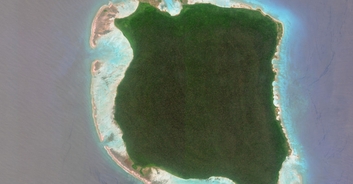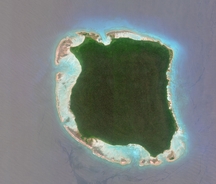The tribespeople of North Sentinel island have been called some of the world's most isolated people by Survival International, and as such, a comparatively small amount is known about them.
This is largely due to their habit of aggressively rejecting visitors to the island, an ethos that had lead to all but officially authorised trips to the area being prohibited by the Indian government. This law is in place to shield the tribespeople from diseases to which they have no immunity, though also aims to protect would-be visitors of the island - they are famous for violently rejecting visiting outsiders.
North Sentinel has been reluctantly thrust into the spotlight over the last week due to the death of American John Chau, who purportedly aimed to preach Christianity to the North Sentinelese.
"You guys might think I'm crazy in all of this but I think it's worthwhile to declare Jesus to these people ... God, I don't want to die," reads a note to his family written before his death.
At least three fisherman have since been arrested in connection with the event, reportedly for aiding Chau's journey towards the island. Police officials said:
"Police will interrogate [the accused] to investigate various aspects of the case, including the sequence of events, the sea route followed for North Sentinel Island, the location where the victim landed and the place of the incidence, the location where John Allen Chau was last seen.
"Further, the personal diary/journal of Chau will be analysed afresh accordingly. It will also be ascertained whether the victim had taken the help of these fishermen or others to venture to the North Sentinel Island on earlier occasions."
However, the tribespeople's relationship with the outside world has not always been so chequered. Indeed, one man was able to come as close to being 'friendly' with the North Sentinelese as anyone ever has.

T N Pandit, an Indian anthropologist made visits to the remote island community for decades, as regional head of India's Ministry of Tribal Affairs.
Mr Pandit is now 84, and insists that, despite their bloodthirsty reputation, the group are "peace-loving" and that their reputation for violence is unjustified.
He told the BBC World Service:
"During our interactions they threatened us but it never reached a point where they went on to kill or wound. Whenever they got agitated we stepped back.
"I feel very sad for the death of this young man who came all the way from America. But he made a mistake. He had enough chance to save himself. But he persisted and paid with his life."
For his own part, Mr Pandit's first visit to the island came in 1967, writes the BBC, when he travelled there as part of an expedition. The tribe were first disposed to hide from the visitors in the jungle, but subsequent trips saw the North Sentinelese fire arrows at them.
"We had brought in gifts of pots and pans, large quantities of coconuts, iron tools like hammers and long knives. We had also taken along with us three Onge men (another local tribe) to help us 'interpret' the Sentinelese speech and behaviour.
"But the Sentinelese warriors faced us with angry and grim faces and fully armed with their long bows and arrows, all set to defend their land."

But in 1991, Mr Pandit was part of a remarkable breakthrough in communication with the tribespeople. The North Sentinelese approached the water's edge peacefully, a moment Mr Pandit says he still doesn't fully understand.
"We were puzzled why they allowed us," he admits, "It was their decision to meet us and the meeting took place on their terms."
"We jumped out of the boat and stood in neck-deep water, distributing coconuts and other gifts. But we were not allowed to step onto their island."
Despite the proximity of the two groups, communication proved difficult due to the obvious language barrier, and attempts to use sign language were also unsuccessful. However, there was a moment on the trip where Mr Pandit was threatened by a member of the tribe, a child. As he recalled to the BBC:
"When I was giving away the coconuts, I got a bit separated from the rest of my team and started going close to the shore.
"One young Sentinel boy made a funny face, took his knife and signalled to me that he would cut off my head. I immediately called for the boat and made a quick retreat.
"The gesture of the boy is significant. He made it clear I was not welcome."
The Indian government no longer undertakes gift-giving missions such as these. The tribespeople of North Sentinel Island have made it clear that they would prefer to be left alone, and groups like Survival International have beseeched the international community to do exactly that.
H/T: BBC





